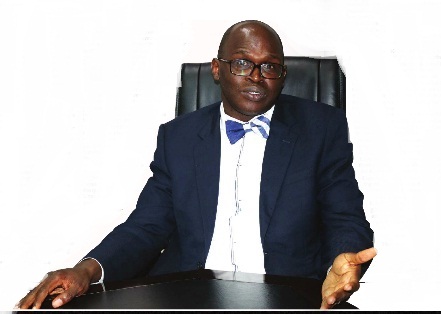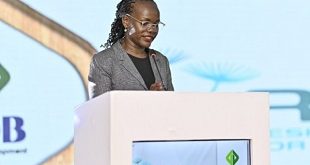Francis Gimara is the newly elected President of Uganda Law Society (ULS). He spoke to The Independent’s Agnes E Nantaba about the rule of law and constitutionalism in Uganda and about his vision for ULS under his leadership.

As the newly elected president of Uganda Law Society, what are your kick-start points?
I take on leadership at a time when the society needs to unify in order to claim its rightful role as the principle protector of its members and the rule of law in general.
On the national scene, I have already proposed to set up a Rule of Law Project which will have a Rule of Law Advisory Committee composed of eminent members of the ULS to routinely advise on matters of rule of law in the country on a consistent basis. This committee will work with the ULS Council to ensure that we attend to the rule of law issues on a regular and more proactive manner.
One of my commitments is to work towards making the ULS more relevant and responsive to members’ needs; so as to reignite and increase the interest of the members in the affairs of their society.
We also intend to be a voice to amplify the challenges affecting the Judiciary and to also hold the judiciary to the highest standard of integrity. For a long time the Judiciary has been severely underfunded and as ULS we need to speak for the Judiciary to ensure that they are well resourced to enable them perform their constitutional mandate. All this is to improve public perception of the judiciary, to fight corruption and make the courts efficient.
What is your assessment of the practice of the rule of law and constitutionalism in Uganda?
In my view, constitutional order is not merely a set of articles in the constitution but is a characteristic of a way of life for a community. In that sense I view a constitution as less of something we have than something we are.
For that reason, the status of the rule of law and constitutionalism is not what it was decades ago but far from what our people desire and deserve. The Constitution set a high benchmark in 1995 but we have witnessed drawbacks in the form of unprincipled amendments. All rule of law indices rate Uganda as retrogressing as opposed to progressing.
If we are to attain a middle income status by 2021 then we have to move to that point where the rule of law is enforced by all.
For instance, the World Justice Rule of Law Index of 2015 rated Uganda 95 out of 102 countries assessed on their adherence to the rule of law. This demonstrates that there is a general decline of the Rule of Law in Uganda. I have since my election to ULS presidency received reports of several incidents that show an increase in cases of arbitrariness over the law as written by Parliament and as interpreted by the Courts. One notices flagrant cases of discrimination in the application of the law, non-compliance with court orders, abuse of court processes and in some instances, executive excesses and weaknesses in the Justice system.
If we are to attain a middle income status by 2021 then we have to move to that point where the rule of law is enforced by all. This is true because the state of our rule of law influences investments decisions, impacts on economic development and the quality of life in Uganda. We must, therefore, build a culture of constitutionalism and not merely be content with a constitution. ULS will continue working with all stakeholders to ensure that the rule of law and constitutionalism is norm other than the exception as the option of not doing so is very costly to society.
In the recent past, there have been public claims about the weakening leadership structures and regional offices of ULS. What is your strategy to revitalising professionalism and respect of the society?
We believe that ULS has grown and its structures need to reflect its growth and diversities. We have embarked on a process of developing a new strategic plan that will point us to where we should be going. Under the new plan, ULS will be repositioned as a key stakeholder in promoting the rule of law in Uganda.
What’s your take on the court ruling by Justice Steven Kavuma to ban FDC defiance activities?
Compliance with orders of court is not a choice; it is an obligation made necessary by the dictates of the law and ULS is a body mandated to advise on legal matters.
Our major contention is that parties were not served and that in adopting an ex parte hearing, the Court failed to accord all parties a fair opportunity to state their case before it made a determination. We found this to be procedurally improper considering that no legal justification meriting an ex parte hearing was made.
Nonetheless, there are legal remedies to rectify this and we have urged the aggrieved party to seek recourse from the Courts.
Chief Justice Bart Katureebe blamed lawyers for failing clients’ cases by coming to court unprepared. How true is it and how do you plan to address this issue?
The Chief Justice did not mean all lawyers are failing their clients as we have many satisfied clients. But there are also those who may have made mistakes and who are being held to account by the relevant structures.
The CJ however makes a very valid point about the conduct of some of our colleagues who are in the habit of coming to court unprepared. There are a number of cases that are lost as a result of poor preparation by the lawyers and this is obviously a betrayal to the clients who have instructed the lawyer. For starters, there are well laid out ethical standards for Advocates to uphold and the Law Council has fairly been tough in dealing with such cases as they form part of professional misconduct.
The course content for the Continous Legal Education programme is also being reviewed to ensure that lawyers are up to date on critical aspects of preparation for their client’s cases to ensure effective service delivery.
 The Independent Uganda: You get the Truth we Pay the Price
The Independent Uganda: You get the Truth we Pay the Price



